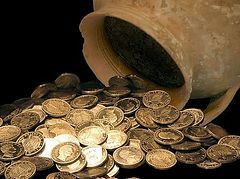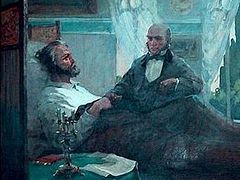Speaking about love of money in our days is just the same as describing hot weather in summer. Everyone suffers torment from the scorching heat in July, and it seems there is no way to hide from it, though there are air conditioners, fans, shady places, and cold water. Very few people like the blazing sun, while the love of money captures our hearts and enslaves us. And this may happen even to those who have no money in their pockets…
Today we are speaking about love of money with Igumen Nektary (Morozov).
—Today very many people face the risk of poverty. How then can we talk about love of money?
—This sin is not of possessing too much gold, silver, or wealth; it is about loving all these material things.
There are many things that every human being needs in order to live in this world—namely food, clothing, money to buy all of this, and a home as we cannot live in the street. Sometimes we need a lot of money to spend on medical services and medicines. And this list is incomplete…
Let us assume that somebody needs a surgical operation. Does this patient feel love for the needle that is inserted in his vein to inject the anesthetic, or for the surgeon’s knife with which the doctor removes his inflamed appendix? Surely he doesn’t. The patient will think of both the needle and the knife as of necessary instruments and will endure this pain. But when it comes to material values and the money to buy basic necessities, the situation is very different. Loving material things appears very dangerous and even ruinous, all the more so because both absolutely penniless people and those possessing numerous treasures of this world can be infected by this passion.
What does “love” mean here? It means that in a situation when you face a choice between the alternatives, namely between the object of your love and your duty, honor, mercy, compassion and, most importantly, faithfulness to God, you will choose the object of your love—money or riches. You won’t give it to somebody who needs it, you will close the doors of your heart to him who is in misery, and you will betray God in one way or another in order to keep or multiply your possessions. This is the greatest harm that comes from love of money.
True, human beings are many-sided creatures, but whenever you are captivated by something you turn your back on something else. Obsession with making money inevitably leads to disregard for spiritual things. I think everybody knows how this obsession manifests itself in a rich person. He has plenty of things to care about—how to manage his wealth, how to protect his riches from those who want to steal them, how to spend his money wisely in order not to run out of it, and how to accumulate more wealth. Those who are busy building and maintaining their wealth realize that success in this business often depends on immoral acts. When you have a large fortune, it is easy for you to take money away from someone else—someone who is poorer and unable to protect his money. True, you can just earn money, but it is much harder than robbing somebody else of their money. Therefore, if you are obsessed with money, you will most probably strip others of theirs. Even if you earn your fortune through honest efforts, you will sooner or later face the alternative: to pay or not to pay taxes, to pay or not to pay a decent salary to your employees, and so on. Beyond all doubt, if you love God more than riches, if you don’t imagine your life without the law of God or at least human moral law (though today there are vague notions of what is signified by this term), you will most likely have a reputation as a kind and fair person. But usually it’s the other way around. In most cases if a person enjoys prosperity, he is guided in his life and his actions not by love of God and the moral law but by something else.
If a money-loving person is penniless, he is like a person who is infatuated with someone but has no hope of reciprocation. He becomes jealous when somebody else approaches the object of his adoration, suffers, is tormented with envy, and gets angry; as a result his heart becomes embittered. So a person who loves money but is “stone-broke” may conclude that his life was a failure. He feels unhappy. He is simply unaware that no matter how much we have, we will always want more. The greater the amount of money we have, the greater our lust for wealth. By speaking about the need to fight the sin of love of money priests mean that it is important to struggle with the love for something that should be no more than a means to attain one’s ends.
—I am have no rich acquaitances, but let me share my impressions of those who, as you’ve said, suffer from an “unrequited love of money”. This passion is like an illness, a pathology. People who feel beaten down by life, who endured years of suffering and privation, not the least some survivors of the Leningrad siege by Nazis during the Second World War, won’t “give you a glass of water on a rainy day”, as the saying goes… And what about collecting single slippers? Isn’t it a manifestation of love of material things, too?
—As for slippers, this is an example of extreme greed for material wealth that turns into absurdity. But I can’t agree that signs of this sinful passion manifest themselves in those who underwent hardships. Quite the opposite—people who experienced hunger and learned to be content with very little are usually much more generous than those who are well off. Sometimes these people share not only the things that they have in abundance but also the things they lack. St. Petersburg (including Leningrad under siege) has never been a city of greedy people. True, long-term destitution and privation may cause breakdown and mental disorders, but that’s another story…
There is one remarkable story in the Lives of the Saints. Once the Venerable Abba Daniel, while wandering stopped in one village where a man (who didn’t look rich at all) came up to him and offered him shelter for the night. The man was named Eulogius and he was a stone cutter by trade. He lived on a very small portion of his earnings and with remainder he would feed the poor and shelter strangers every day. Abba Daniel came to love Eulogius and admired him so much that he entreated God to give this man more money to increase his works of mercy. The Lord answered him: “He [Eulogius] doesn’t need more money.” But Abba Daniel persevered in prayer and God answered him again: “I will grant your request, but the implications will rest on your shoulders.” Soon after that Eulogius found buried treasures, moved to another city, bought himself an estate, took up residence there, abandoned his works of mercy, and didn’t allow any paupers “within gunshot of himself”, as the saying goes. Even Abba Daniel who came to see his old friend was not allowed in! Then the ascetic implored the Lord to forgive him his unwise prayers. As a result the stone cutter was ruined, returned to his village to make an honest living again and take care of the poor, as before…
Possessions have tremendous power and influence. It seems that as long as we are people of modest means we are happy with it, but when an opportunity knocks, we seize it immediately. That is why we should be attentive to ourselves, and once our heart has begun to fuse with possessions, we must sever these ties. The Lord Himself sends us situations when we can overcome this passion in a natural way, but sometimes our passion is so deeply ingrained in us that we reject everything that God sends us…
—The more we give, the more we receive. But that’s not to say that we should expect anything in return.
—Yes, if you pursue your own ends in giving something away to somebody else, you should be prepared to have your aim remain unattained.
—And one more “law”. If you have twenty cents in your pocket, it is easier to part with them than with twenty dollars.
—Yes, you reckon on this amount of money, plan to buy something with it, but suddenly somebody asks for this money… And it is very hard to part with this money. However, this shouldn’t be done in every case. It depends on who is asking and why he is asking you.
Apostle Paul said that our abundance should be a supply for our neighbors’ want (cf. 2 Cor. 8:14). We will have to answer for what we have and not for what we don’t have. Indeed some ascetics despised all worldly things to an extreme degree and, looking at them, we see them as if they lived beyond the standards of humanity and even Christianity. For example, St. Philaret the Merciful would give away all that he earned, though he had a large family to provide for. Eventually his family ended up “in dire straits”. But the Lord returned a hundredfold to St. Philaret and his household, and his daughter eventually became the wife of a Byzantine emperor. There was another wonderful ascetic, Schema-Archimandrite Vitaly (Sidorenko) from Tbilisi who would constantly give away whatever he acquired or whatever was given to him. At first he lived in a cell in the mountains and he naturally had no possessions there. But later the ascetic moved to a city where people would donate to him blankets, shoes and other things, and he would immediately give them away, crying, “I keep asking them, ‘Give things away, give away!’ But they are giving me these gifts all the time.” But these examples are out of the common run, as it were. St. Barsonuphius the Great even gave the following advice: if somebody comes to you and asks you for something, but you need this thing yourself, you have a right to turn down his request. For if you can part with something and then won’t regret it, and it won’t cause inconvenience to your household who have the title to this property just as you have, then you can give it away. But if you are giving away your last possessions, you must think of those around you and what you are going to do next. Because if you give away your last possessons now and then go and ask somebody else for the same things, will that make sense?
But there are some situations when you ought to give your last penny to somebody who desperately needs it. People with a clear conscience see and know this.
—Many justify the sin of love of money by their responsibilities towards their families. How can a man with a family on his hands discern where the norm is and when he has got carried away by the provision of his nearest and dearest with material goods?
—If you are the breadwinner in a large family, you indeed must work very hard to support it. And this is your duty to those who are dependent on you materially, rather than greed for money. But it is another matter when for some reason somebody cannot earn as much as he wants—and he shouldn’t grieve, give way to despair, or stop walking towards God because of this. If your children are crying of hunger, you must strain every nerve to earn enough money, though…
—But what if one’s wife and kids want something in addition to their basic needs? For example, roller skates or a new car? And the head of the family loves them and cannot refuse to meet their wishes?
—I would advise all couples to define the term “loves” in their family life. Is it only about acquiring material goods or deriving happiness from being together, even if without roller skates and new cars? Spouses are happy that they are soul friends, understand each other, rejoice in what they have, and reconcile themselves to what they lack.
The criterion of the norm is the same here. If you see that the things you want to possess captivate and enslave you, it means that something is really wrong here. Let us assume that someone is striving for the joy of possessing something. A life entirely devoted to pursuing this goal appears to lack positive emotions, peace, and an opportunity to have a rest. Once he has achieved his aim, he feels no joy. As a result the person deceives himself. You can hang a carrot to a donkey’s muzzle: the more the donkey chases it, the more the carrot moves forward and remains out of reach. This comparison was wisely suggested by Archimandrite Raphael (Karelin) in one of his sermons. A desire to possess is unquenchable and it can never be satiated. First you want to have something “necessary”, and then you want something that is better than what you already have, and then, something that is better than what somebody else has, and so forth.
It is natural and not reprehensible for people to want to have their basic needs met and in a quality way. But the question is what price one is supposed to pay for this. And this price shouldn’t be one’s whole life, heart, and being. Do we live to acquire or acquire to live? Our answer will dot the ‘I’s and cross the ‘t’s. If somebody lives in order to acquire, it means that there has been a substitution of values in his heart. The means has suddenly turned into the purpose and vice versa.
 “The Covetous Knight” by Vladimir Favorsky. From a series of engravings for Pushkin’s Little Tragedies. 1959-1961
“The Covetous Knight” by Vladimir Favorsky. From a series of engravings for Pushkin’s Little Tragedies. 1959-1961 —In our days, “possession” of something has become a matter of prestige and decorum. If you don’t have an up-to-date cellphone, that is considered “improper”. And this tendency begins from childhood. While in my childhood we judged somebody’s “fitness” by their results in school competitions, today everybody judges others by the model of the tablet that their dads gave them for their birthday… What are the reasons behind this phenomenon?
—The reasons are numerous, but the main reason is that today the concept of the human personality is being lost. That is true not only about somebody else’s personality, but even our own personality as well. People are losing the depth which must be inherent in us and the fullness of life that we must have. In other words, there is really not much going on inside modern people. Thus, having very little to cherish inside themselves, they strive to make a strong impression on others by the things they possess materially. And naturally he who manages to acquire something begins to brag about it, while he who has nothing (including inside himself) begins to suffer, feels hurt, oppressed and insulted.
—How can we teach our children to have the right attitudes to things?
—We should give our children something that will be more important for them than property so that they can feel fulfilled—no matter whether they will be able to afford to buy a car for their wives or not.
We know people living in reduced circumstances who envy the owner of a limo who splashes water and mud on them. These poor people fail to understand that this luxury car driver, who has millions of dollars in his accounts, is bursting with envy looking at some tycoon who owns a football club, a private jet, and a yacht. And the latter, I suppose, experiences a sharp pang of jealousy seeing somebody else…
—As we know, pride is the mother of all sins. And if we learned to trust God with humility, our lives would change… I believe that love of money is the root of many other sins, too. For instance, an avaricious person cannot be kind. Is this true?
—Initially a money-loving person can be kind, but as the passions develop, his virtues ebb away. We human beings are dependent on the habits we acquire. If we deny assistance to somebody else two, three, or four times and so on, then nothing will remain of our kindness. First we are tormented by doubts; we want and don’t want to give at the same time, and our unwillingness prevails. Human nature is such that we strive to minimalize our own suffering. So we learn not to give while suffering no pangs of remorse. For this purpose we harden our hearts, close them so that no one can find their way to them. “No one” applies not only to people but also to God. Why do we suffer? Because we have pangs of conscience. And this is not only conscience but also our guardian-angels and the Lord Himself, Who knocks at the door of everybody’s heart. And in order not to give we learn not to listen to God and ignore His calls.
Love of money is the sin of distrust in God. Where does this feverish desire to acquire stem from? People base their hopes for material well-being on this. As long as people trust in God rather than their possessions, the Almighty guides them. When they prioritize property and possessions, the situation changes radically. They gradually become alien to God.
—How can we struggle with love of money? After all, to varying degrees love of money lives in the hearts of all of us.
—The Lord cares about it, and in different ways at that. For example, we have lost our purse with money in it. This is a means to overcome our love of money. Instead of ranting and raving we should say: “The Lord is teaching us to part with our money painlessly.” If we have to give something that otherwise would be useful for us, it means the Lord is teaching us to love others and subdue our love of money.
When you begin to give, you little by little get into the habit of giving, which is very important. St. John Chrysostom used to say that if it is hard for you to give what you need, start with giving the things you don’t need, and thus you will develop this habit and learn to share even your last possessions with others. However, in sharing the things we don’t really need, we should never praise ourselves: “I did well to share this! I’d rather stop here!” There are some functionaries (bureaucrats, to be more precise) who are accustomed to taking. And when faced with situations when they have to give, these individuals are driven to a frenzy compared to a drug addicts’ withdrawal pains. I have seen them with their perplexed faces in such moments, saying: “How can it be? I must give?!” And “give” without receiving anything in return! And many prove incapable of giving. Indeed it is a matter of habit.





